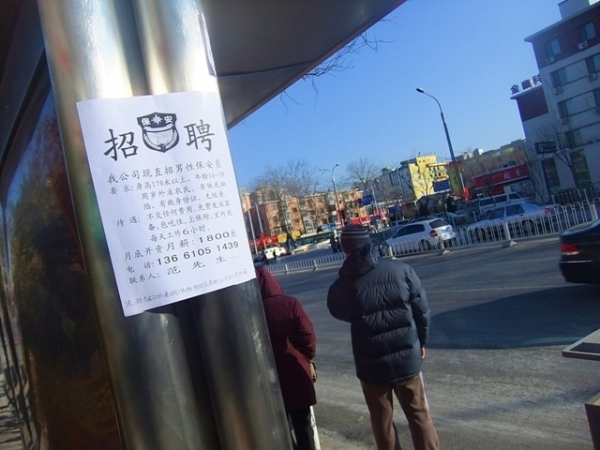By Darwin Wally T. Wee a freelance journalist on exchange with the Economic Observer.

A job vacancy advertised in the window of a cafe in Sanlitun, a district of central Beijing. Photos by Souksakhone Vaenkeo
Factory bosses and shop owners across China are scrambling to woo migrant workers, as they make a familiar discovery for this time of year; many of last year’s staff failed to report to work after the Spring Festival holiday.
Several media reports have again indicated a shortage of laborers citing employers complaining about the low turnout of their workers.
Low salaries, no potential for development, an inability to learn new techniques and pressure from their aging parents to work near their hometowns are some of the major reasons why a fraction of the workforce decided not come back to their work.
To persuade migrant workers from coming back, employers uses various tactics such as wage hikes, offering irresistible benefits, and of course cash incentives.
"The gift money for those who return to work on time is around 1,000 yuan. Moreover, we offer a cash award of between 100 yuan and 600 yuan for those who return and introduce their fellow farmers to the factory," Zhou Baixian, the deputy manager of a Zhejiang shoe factory told China Daily as he complained that only 80% of his employees returned to work.
Desperate employers pay brokers to hunt for workers to fill their labor-intensive manufacturing plants.
Global Times reported that brokers have set up booths in major train terminals in coastal China to “snap up job candidates.” Migrant workers on their way out of the station are handed job ads.
"Currently, we are in desperate need of workers. Worker shortages are seen everywhere especially in clothing manufacturers. So far, about 70 percent of the positions at clothing factories are still vacant. In addition, worker shortages can also be seen in the processing and service industries,” an unnamed employer outside the train station told Global Times.
Even in Beijing, job-hiring advertisements are everywhere from bus stations, shops, and even in tourist destination areas.
The vacancies range from security guards, waiters and cooks to highly technical posts such as computer programmers.
The lack of laborers is a catastrophe for manufacturers who need to finish their products on time to fulfill the orders from abroad, especially as the global economic uncertainty means such orders are getting scarcer.
"Without skilled workers, I won't be able to complete orders on schedule," Liu Xiaoyu, the general manager of Huahui Electronic Company, told the China Business Journal.
That paper’s report said that at least 10 percent of laborers would not go back to work according to the survey conducted by the government of Dongguan, adding that Shenzhen had about 200,000 vacancies after the 2011 holiday.
Other vacancies advertised around Beijing:



